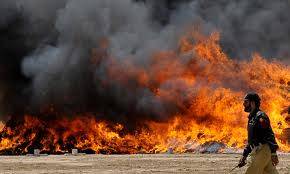Customs personnel have seized more than 400 kilograms of heroin and 27 kilograms of opium near Quetta. Balochistan seems to be the new home of heroin- another challenge we have to face in the fight against terrorism. Balochistan is a transit route to smuggle narcotics to the Gulf States and Iran, which are then to be transported to Europe. It borders with Afghanistan’s volatile Helmand province the home of opium production. The narcotics trade is one way for terrorists to get money to fun operations. It has been so for the Afghan Taliban for a long time.
A senior official of the Anti-Narcotics Force (ANF) said on Friday that this is an impression created by Americans that the TTP is funded through the sale or smuggling of narcotics is getting any financial support from the Afghan Taliban. Sources in the ANF blame the foreign hand, especially India. But India has such power, that it is conducing massive drugs smuggling in the nether regions of our country with such coordination with the Afghan Taliban in Helmand? If this is the truth, it is indeed stranger than fiction. It has been no secret that the Taliban in Afghanistan encouraged poppy cultivation, though they did ban its consumption in Afghanistan. The transit of narcotics through Balochistan is hardly a new phenomenon, its been going on for years. Since 2001 Pakistan has made an effort to end the cultivation of poppies. Cultivation and production is an Afghan problem, its transport has been ours since 2001. Quite simple there is a market, and criminal elements here and in Afghanistan are exploiting it.
In 2011, the ANF reported having destroyed over 1,000 hectares of the approximately 1,700 hectares that the UN reported were cultivated in Pakistan in 2010. These reports are unverified as much of the area where poppy is cultivated is in FATA. In 2011 Law enforcement agencies reported 85,471 arrests in narcotics cases. Many of these arrests were of small-time traffickers and drug users, accounting for the large numbers arrested. Only 7,183 convictions in narcotics cases were made. Many seemingly strong narcotics cases are reversed on appeal. The justice system also has to stop letting drug barons off the hook. The biggest example is of the 2012 ephedrine case in which politicians including Musa Gillani and Minister for Textile Industries Makhdoom Shahabuddin escaped without any charges as ephedrine was not in the list of drugs in Pakistan. Such court decisions are detrimental to the moral of ANF and other drug enforcing agencies and encourages the activity. Even now, those in custody over the Quetta case are the small-time middle men. The security apparatus has to make an effort to stop trafficking across the border and find and prosecute any elements within itself that aid the activity.
Friday, April 19, 2024
Our Drug Problem

A Tense Neighbourhood
April 19, 2024
Dubai Underwater
April 19, 2024
X Debate Continues
April 19, 2024
Hepatitis Challenge
April 18, 2024
IMF Predictions
April 18, 2024
Kite tragedy
April 19, 2024
Discipline dilemma
April 19, 2024
Urgent plea
April 19, 2024
Justice denied
April 18, 2024
AI dilemmas unveiled
April 18, 2024
ePaper - Nawaiwaqt
Advertisement
Nawaiwaqt Group | Copyright © 2024





